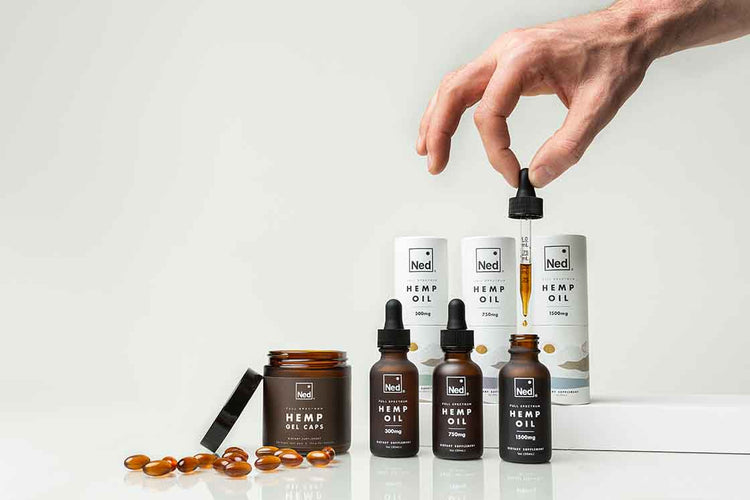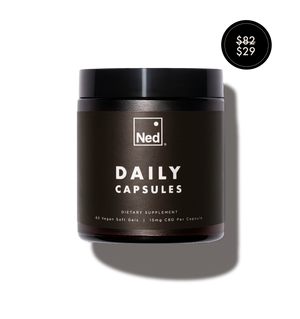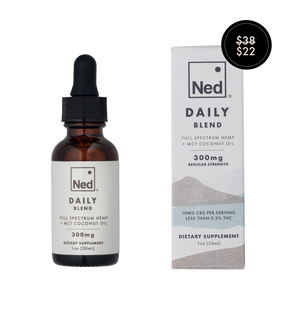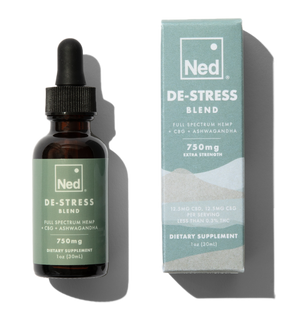Daily Capsules
60 vegan capsules | 15mg CBD per capsule
Restore, relax, and reinvigorate your cells with Daily Capsules. Made from the world’s finest organic hemp flowers, each gel cap packs 15 mg of CBD plus hundreds of beneficial hemp compounds to awaken the cannabinoid system and aid immune function. Use daily to support inflammation, stress & anxiety, sleep, pain relief, cell growth and more!
60-day Stress Free Guarantee
Simply place your order. Your 60-day trial begins from the day your order is delivered.
Start using your Ned product. Our Customer Happiness Team is here to give you all the guidance you need.
If you want to break things off, no hard feelings. Contact our Customer Happiness Team and they’ll help you out. Simple.
**Valid for one product at a time - bundles not eligible
CBD Capsules and tinctures are two methods for consuming cannabidiol (CBD) oil, which is available in 3 forms: isolate, broad spectrum, and full spectrum.
Full spectrum extract is the most complete extract because, along with cannabinoids like CBD, it also contains hundreds of other beneficial phenolic compounds, such as terpenes, flavonoids, stilbenes, and others.
Terpenes, like other phenolics have various unique health benefits. In addition, terpenes possess enhancement activity for the therapeutic properties of cannabinoids, other compounds, as well as some pharmaceuticals such as tuberculosis antibiotics [1][2].
Both capsules and tinctures are usually made with some form of CBD extract blended with a carrier oil such as MCT, hempseed, or olive oil. Ned uses organic MCT, which studies suggest is the most likely to protect the mixture from oxidative damage and degradation [3].
CBD Capsules
What are CBD Capsules?
CBD capsules or pills contain CBD extract plus a carrier oil. Ned CBD capsules are made with our powerful full spectrum hemp extract and blended with organic MCT oil.
Unlike most competing products that are encapsulated in gelatin, which is an animal protein, or cellulose, which is a wood pulp fiber, Ned encapsulates its CBD oil in vegan capsules made from tapioca starch, vegetable glycerin and distilled water.
Capsules are best consumed with fatty foods, are absorbed in the digestive system, and offer advantages such as convenience and ease of use.
How to use CBD Capsules: Swallow, preferably with food
CBD hemp oil capsules, which contain both hemp extract and MCT can be swallowed on their own. However, swallowing capsules with a fat containing meal is recommended to improve bioavailability.
CBD and other cannabinoids such as THC are lipophilic, meaning they tend to combine with or dissolve in lipids or fats.
Studies comparing the bioavailability of cannabinoids consumed with and without food show that eating cannabinoids with fats improves their absorption leading to higher cannabinoid levels in the body.
Studies have demonstrated that when compared to administering CBD oil on an empty stomach, administering CBD with a high-fat/high-calorie meal can elicit four-fold increases in blood plasma CBD concentrations [4].
Avocados, cheese, dark chocolate, nuts, fatty fish, eggs, olive oil, and grass-fed butter are healthful high-fat foods that can help improve the absorption of CBD and other minor lipophilic cannabinoids in full-spectrum hemp extract.
Absorption: Gastrointestinal tract (aka the gut)
Whereas much of the bioactive contents found in tinctures enter the bloodstream sublingually, CBD capsules dissolve in and are absorbed in the digestive system - mainly in the gastrointestinal (GI) tract, aka the gut, and to a lesser extent in the liver.
According to anatomical, physiological, and pharmacological studies, the endocannabinoid system (ECS), a communication network fueled by cannabinoids, is widely distributed throughout the GI tract and the digestive system.
In the gut, the ECS is involved in the regulation of food intake, nausea and emesis, gastric secretion and gastroprotection, ion transport, visceral sensations, GI motility, intestinal inflammation, and cell proliferation.
WHAT'S BEST FOR ME?
While both are effective in their own ways, CBD capsules and CBD tinctures have different methods of administration, absorption, and action.
CBD capsules are discrete, tasteless, and offer consistent dosage via oral administration.
CBD tinctures are fast-acting and offer flexible dosage via sublingual or under the tongue administration. Rather than passing through the digestive system like capsules, tinctures enter the body through the bloodstream via sublingual glands.
Benefits of capsules vs tincture
Capsules allow for easy, accurate, pre-measured dosing, and discrete, tasteless consumption, which is convenient on the go and can easily be added to as part of a regular vitamin/supplement regimen.
Capsules also dissolve in the gastrointestinal tract where their contents are able to interact with the gut’s endocannabinoid system.
Studies show that activating cannabinoid receptors within the gut can inhibit peristalsis (a series of muscle contractions occurring in the digestive tract) and gastric acid secretion [5].
Evidence also suggests that endocannabinoid system dysregulation might play a role in intestinal disorders such as inflammatory bowel disease, irritable bowel syndrome, and obesity [6][7].
Because CBD capsules dissolve in your gastrointestinal tract and to a lesser extent in the liver, it may take some time to feel their effects and the effects you experience may be different from those of a sublingually administered tincture.
In one study, participants with moderate to severe liver impairment had higher blood CBD concentrations and longer clearance times after the same 200 mg dose levels compared to healthy controls, suggesting that the health of a person’s liver can impact the effectiveness of CBD as well as how long it remains in the body [8].
CBD Tinctures
What are CBD Tinctures?
CBD tinctures, which are almost always vegan, are a mixture of CBD extract (isolate, broad spectrum, or full spectrum) and either a carrier oil or alcohol. Ned tinctures are made with full spectrum hemp oil and organic MCT.
Although the terms CBD oil and tincture are sometimes used interchangeably, as discussed above, a tincture is just one vehicle for CBD administration.
Tinctures are absorbed into the bloodstream sublingually, and offer the advantage of increased blood serum concentrations, and quick action times. As with capsules, eating some fat containing foods with a dose of tincture is recommended to enhance bioavailability.
How to use CBD Tinctures: Sublingually, preferably with food
CBD tinctures should be dosed sublingually or under the tongue and held there for a minimum of 30 seconds and up to four minutes, which researchers believe is the ideal time to maximize absorption.
Tinctures typically come with a graduated measurement marked glass dropper and information on how many milligrams of CBD can be found in 0.25 mL of tincture. For example, 0.25mL of Ned’s full spectrum 1500 mg CBD oil contains 12.5 mgs of CBD.
Select your dose, drop it under your tongue, hold it there (ideally for four minutes), and swallow what remains.
Like capsules, tinctures are best taken with high fat foods, which help increase CBD blood serum concentrations. Research shows that the fat content of a meal can lead to significant increases in CBD plasma concentration [9].
Absorption: Sublingual (aka under the tongue)
CBD tincture placed under the tongue is absorbed sublingually, meaning it enters the bloodstream while bypassing the digestive system.
Sublingual glands (also known as salivary glands) are found underneath the tongue. They produce mucin and help promote the production of saliva.
Due to the high permeability and rich blood supply of sublingual glands, the sublingual method of absorption allows certain substances such as cannabinoids to be rapidly absorbed into the blood vessels under the tongue rather than the digestive tract [10].
Peak blood levels of CBD for sublingual tincture administration have been measured within about 2 hours [11]. Compared to oral dosing which requires passage through the digestive system, sublingual dosing allows for quicker absorption of cannabinoids and greater bioavailability.
Bioavailability refers to the ratio of substance that is absorbed into the bloodstream. Higher values indicate that a compound is more efficiently assimilated into the body.
Whereas the contents of CBD capsules pass through the digestive system where they can interact with molecular targets in the gut and liver, the active compounds in tincture enter directly into the bloodstream which allows them to relocate to different areas of the body where they are needed.
Benefits of CBD tincture vs capsules
Tinctures, while not as easy and convenient to dose in a hurry as capsules, have several benefits, especially for those who dislike swallowing pills.
Tinctures make it easier to fine tune your dose as you can add or subtract as much or as little from the measured dropper as you want.
Because tinctures enter the bloodstream sublingually, many users observe their effects quicker than with oral capsule administration.
Tinctures also have higher bioavailability than capsules, meaning more CBD can be found in blood serum concentrations where it can travel throughout the body to where it is needed.
Takeaway
While both are effective in their own ways, CBD capsules and CBD tinctures have different methods of administration, absorption, and action.
CBD capsules are discrete, tasteless, and offer consistent dosage via oral administration. They pass through the gut and to a lesser extent, the liver, where they can interact with the endocannabinoid system of the digestive tract.
CBD tinctures are fast-acting and offer flexible dosage via sublingual or under the tongue administration. Rather than passing through the digestive system like capsules, tinctures enter the body through the bloodstream via sublingual glands.
Sources
- LaVigne, J. E., Hecksel, R., Keresztes, A., & Streicher, J. M. (2021). Cannabis sativa terpenes are cannabimimetic and selectively enhance cannabinoid activity. Scientific reports, 11(1), 1-15.
- Sieniawska, E., Swatko-Ossor, M., Sawicki, R., Skalicka-Woźniak, K., & Ginalska, G. (2017). Natural terpenes influence the activity of antibiotics against isolated Mycobacterium tuberculosis. Medical Principles and Practice, 26(2), 108-112.
- Pavlovic, R., Nenna, G., Calvi, L., Panseri, S., Borgonovo, G., Giupponi, L., ... & Giorgi, A. (2018). Quality traits of “cannabidiol oils”: cannabinoids content, terpene fingerprint and oxidation stability of European commercially available preparations. Molecules, 23(5), 1230.
- Taylor, L., Gidal, B., Blakey, G., Tayo, B., & Morrison, G. (2018). A phase I, randomized, double-blind, placebo-controlled, single ascending dose, multiple dose, and food effect trial of the safety, tolerability and pharmacokinetics of highly purified cannabidiol in healthy subjects. CNS drugs, 32(11), 1053-1067.
- DiPatrizio, N. V. (2016). Endocannabinoids in the Gut. Cannabis and cannabinoid research, 1(1), 67-77.
- Izzo, A. A., & Sharkey, K. A. (2010). Cannabinoids and the gut: new developments and emerging concepts. Pharmacology & therapeutics, 126(1), 21-38.
- Izzo, A. A., Piscitelli, F., Capasso, R., Aviello, G., Romano, B., Borrelli, F., ... & Di Marzo, V. (2009). Peripheral endocannabinoid dysregulation in obesity: relation to intestinal motility and energy processing induced by food deprivation and re‐feeding. British journal of pharmacology, 158(2), 451-461.
- Taylor, L., Gidal, B., Blakey, G., Tayo, B., & Morrison, G. (2018). A phase I, randomized, double-blind, placebo-controlled, single ascending dose, multiple dose, and food effect trial of the safety, tolerability and pharmacokinetics of highly purified cannabidiol in healthy subjects. CNS drugs, 32(11), 1053-1067.
- Birnbaum, A. K., Karanam, A., Marino, S. E., Barkley, C. M., Remmel, R. P., Roslawski, M., ... & Leppik, I. E. (2019). Food effect on pharmacokinetics of cannabidiol oral capsules in adult patients with refractory epilepsy. Epilepsia, 60(8), 1586-1592.
- Narang, N., & Sharma, J. (2011). Sublingual mucosa as a route for systemic drug delivery. Int J Pharm Pharm Sci, 3(Suppl 2), 18-22.
Daily Capsules
60 vegan capsules | 15mg CBD per capsule
Restore, relax, and reinvigorate your cells with Daily Capsules. Made from the world’s finest organic hemp flowers, each gel cap packs 15 mg of CBD plus hundreds of beneficial hemp compounds to awaken the cannabinoid system and aid immune function. Use daily to support inflammation, stress & anxiety, sleep, pain relief, cell growth and more!
60-day Stress Free Guarantee
Simply place your order. Your 60-day trial begins from the day your order is delivered.
Start using your Ned product. Our Customer Happiness Team is here to give you all the guidance you need.
If you want to break things off, no hard feelings. Contact our Customer Happiness Team and they’ll help you out. Simple.
**Valid for one product at a time - bundles not eligible
Daily Blend
30mL (1oz)
Simplify your daily ritual with Daily Blend, a single all-natural primer for better health and wellness. Slow crafted from the world’s purest USDA certified organic hemp, Daily Blend helps you build your health on a strong foundation by bringing your body back into balance (think of it as restoring your body to its optimal factory settings!) and providing functional support for sleep, stress, and pain + inflammation.
60-day Stress Free Guarantee
Simply place your order. Your 60-day trial begins from the day your order is delivered.
Start using your Ned product. Our Customer Happiness Team is here to give you all the guidance you need.
If you want to break things off, no hard feelings. Contact our Customer Happiness Team and they’ll help you out. Simple.
**Valid for one product at a time - bundles not eligible
De-Stress Blend
De-Stress Blend is a natural path to stilling your waters and getting back to easier times. This blend is dominant in CBG – often referred to as the mother of all cannabinoids - and CBD, both extracted from the world’s purest full spectrum hemp and features a botanical infusion of ashwagandha, cardamom and cinnamon.
60-day Stress Free Guarantee
Simply place your order. Your 60-day trial begins from the day your order is delivered.
Start using your Ned product. Our Customer Happiness Team is here to give you all the guidance you need.
If you want to break things off, no hard feelings. Contact our Customer Happiness Team and they’ll help you out. Simple.
**Valid for one product at a time - bundles not eligible








